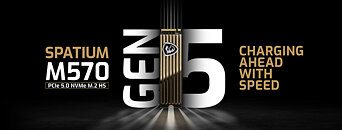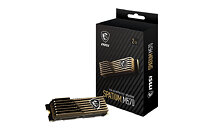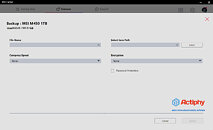MSI, the world's leading gaming PC hardware brand, is announcing the launch of the next-gen model to its SSD product line - SPATIUM M570 PCIe 5.0 NVMe M.2 HS. With the same gamers' first attitude that has made MSI products great, MSI continues pushing the limits to unleash next-level storage performance with the latest PCIe Gen 5 controller technology and state-of-the-art 3D NAND flash, providing up to 1.5 times faster read/write speeds compared to the previous generation SSDs. On SPATIUM M570, the aluminium bronze-colored heatsink improves heat dissipation to sustain transfer speeds for professionals, content creators, and gamers to gain valuable milliseconds on latency or to process gigabytes of files. Other performance-improving technologies include DRAM cache buffer and an SLC cache.



The SPATIUM M570 HS is powered by the latest PCIe Gen 5 controller technology with high-quality 3D NAND flash, and advanced cooling takes a sensational leap in storage performance, unleashing the latest in extreme transfer rates of up to 10,000 MB/s sequential read & write speeds for demanding professionals, content creators, and gamers in an easy installation. Sporting a bronze-colored aluminium heatsink, the stacked fin structure efficiently dissipates heat from the M570, and sustains maximum throughput under heavy workloads. With compliance of NVMe 2.0 and M.2 2280 form factor, the SPATIUM M570 HS offers optimal performance and long-lasting durability in 1 TB and 2 TB capacity variants. The SPATIUM M570 HS supports a comprehensive range of data error correction features including LPDC ECC and E2E Data Protection, providing a high-rated TBW (Terabytes Written) for excellent durability and longevity backed with a limited 5-year warranty.
Advanced Software for SSD Status Monitoring & Data Backup Empowered by Actiphy
MSI is providing an advanced software solution with system status monitoring and data backup, built into MSI Center. While using MSI center, the user can see comprehensive information regarding the SSD status including drive health, used capacity, and current operating temperature.
Additionally, MSI has partnered with Actiphy, a world-leading data backup solution, to allow users who purchase and install MSI SSDs into their PC system the ability to create backups.
View at TechPowerUp Main Site | Source



The SPATIUM M570 HS is powered by the latest PCIe Gen 5 controller technology with high-quality 3D NAND flash, and advanced cooling takes a sensational leap in storage performance, unleashing the latest in extreme transfer rates of up to 10,000 MB/s sequential read & write speeds for demanding professionals, content creators, and gamers in an easy installation. Sporting a bronze-colored aluminium heatsink, the stacked fin structure efficiently dissipates heat from the M570, and sustains maximum throughput under heavy workloads. With compliance of NVMe 2.0 and M.2 2280 form factor, the SPATIUM M570 HS offers optimal performance and long-lasting durability in 1 TB and 2 TB capacity variants. The SPATIUM M570 HS supports a comprehensive range of data error correction features including LPDC ECC and E2E Data Protection, providing a high-rated TBW (Terabytes Written) for excellent durability and longevity backed with a limited 5-year warranty.
Advanced Software for SSD Status Monitoring & Data Backup Empowered by Actiphy
MSI is providing an advanced software solution with system status monitoring and data backup, built into MSI Center. While using MSI center, the user can see comprehensive information regarding the SSD status including drive health, used capacity, and current operating temperature.
Additionally, MSI has partnered with Actiphy, a world-leading data backup solution, to allow users who purchase and install MSI SSDs into their PC system the ability to create backups.
View at TechPowerUp Main Site | Source



